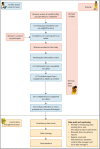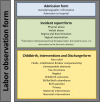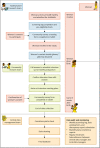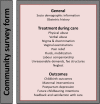Methodological development of tools to measure how women are treated during facility-based childbirth in four countries: labor observation and community survey
- PMID: 30442102
- PMCID: PMC6238369
- DOI: 10.1186/s12874-018-0603-x
Methodological development of tools to measure how women are treated during facility-based childbirth in four countries: labor observation and community survey
Abstract
Background: Efforts to improve maternal health are increasingly focused on improving the quality of care provided to women at health facilities, including the promotion of respectful care and eliminating mistreatment of women during childbirth. A WHO-led multi-country research project aims to develop and validate two tools (labor observation and community survey) to measure how women are treated during facility-based childbirth. This paper describes the development process for these measurement tools, and how they were implemented in a multi-country study (Ghana, Guinea, Myanmar and Nigeria).
Methods: An iterative mixed-methods approach was used to develop two measurement tools. Methodological development was conducted in four steps: (1) initial tool development; (2) validity testing, item adjustment and piloting of paper-based tools; (3) conversion to digital, tablet-based tools; and (4) data collection and analysis. These steps included systematic reviews, primary qualitative research, mapping of existing tools, item consolidation, peer review by key stakeholders and piloting.
Results: The development, structure, administration format, and implementation of the labor observation and community survey tools are described. For the labor observations, a total of 2016 women participated: 408 in Nigeria, 682 in Guinea, and 926 in Ghana. For the community survey, a total of 2672 women participated: 561 in Nigeria, 644 in Guinea, 836 in Ghana, and 631 in Myanmar. Of the 2016 women who participated in the labor observations, 1536 women (76.2%) also participated in the community survey and have linked data: 779 in Ghana, 425 in Guinea, and 332 in Nigeria.
Conclusions: An important step to improve the quality of maternity care is to understand the magnitude and burden of mistreatment across contexts. Researchers and healthcare providers in maternal health are encouraged to use and implement these tools, to inform the development of more women-centered, respectful maternity healthcare services. By measuring the prevalence of mistreatment of women during childbirth, we will be able to design and implement programs and policies to transform maternity services.
Keywords: Childbirth; Disrespect and abuse; Ghana; Guinea; Maternal health; Mistreatment; Myanmar; Nigeria; Obstetric delivery; Quality of care.
Conflict of interest statement
Authors’ information
Not applicable.
Ethics approval and consent to participate
This study was approved by the World Health Organization Ethical Review Committee (protocol: A65880) and the World Health Organization Human Reproduction Programme (HRP) Review Panel on Research Projects (RP2). This study was also approved by in-country ethical committees in: Guinea [le comité national d’éthique pour la recherche en santé, protocol ID: 024/CNERS/15]; Nigeria [Federal Capital Territory Health Research Ethics Committee (protocol ID, FHREC/2014/01/72/28–11-14); Research Ethical Review Committee, Oyo State (protocol ID AD13/479); and State Health Research Ethics Committee of Ondo State (protocol ID AD 3693/299)]; Ghana [Ethical Review Committee of the Ghana Health Service (GHS) (Protocol ID GHS-ERC-13/01/15)]; and Myanmar [Ethics Review Committee, Department of Medical Research (protocol ID (Ethics/DMR/2017/096)]. All participants provided written informed consent prior to participation.
Consent for publication
Not applicable.
Competing interests
The authors declare that they have no competing interests.
Publisher’s Note
Springer Nature remains neutral with regard to jurisdictional claims in published maps and institutional affiliations.
Figures





Similar articles
-
How women are treated during facility-based childbirth: development and validation of measurement tools in four countries - phase 1 formative research study protocol.Reprod Health. 2015 Jul 22;12:60. doi: 10.1186/s12978-015-0047-2. Reprod Health. 2015. PMID: 26198988 Free PMC article.
-
How women are treated during facility-based childbirth in four countries: a cross-sectional study with labour observations and community-based surveys.Lancet. 2019 Nov 9;394(10210):1750-1763. doi: 10.1016/S0140-6736(19)31992-0. Epub 2019 Oct 8. Lancet. 2019. PMID: 31604660 Free PMC article.
-
Respectful maternity care in Ethiopian public health facilities.Reprod Health. 2017 May 16;14(1):60. doi: 10.1186/s12978-017-0323-4. Reprod Health. 2017. PMID: 28511685 Free PMC article.
-
Expanding the agenda for addressing mistreatment in maternity care: a mapping review and gender analysis.Reprod Health. 2018 Aug 28;15(1):143. doi: 10.1186/s12978-018-0584-6. Reprod Health. 2018. PMID: 30153848 Free PMC article. Review.
-
Respectful maternity care during childbirth in India: A systematic review and meta-analysis.J Postgrad Med. 2020 Jul-Sep;66(3):133-140. doi: 10.4103/jpgm.JPGM_648_19. J Postgrad Med. 2020. PMID: 32675449 Free PMC article.
Cited by
-
Women's narratives of experiences, drivers and consequences of mistreatment during maternity care in western Ethiopia.PLoS One. 2024 Dec 13;19(12):e0313217. doi: 10.1371/journal.pone.0313217. eCollection 2024. PLoS One. 2024. PMID: 39671438 Free PMC article.
-
Women's experiences of mistreatment during childbirth and their satisfaction with care: findings from a multicountry community-based study in four countries.BMJ Glob Health. 2021 Jan;5(Suppl 2):e003688. doi: 10.1136/bmjgh-2020-003688. BMJ Glob Health. 2021. PMID: 33436494 Free PMC article.
-
Promoting respectful maternity care for adolescents in Ghana: a quasi-experimental study protocol.Reprod Health. 2020 Aug 24;17(1):129. doi: 10.1186/s12978-020-00977-w. Reprod Health. 2020. PMID: 32831100 Free PMC article.
-
Disrespect and abuse during facility-based childbirth in central Ethiopia.Glob Health Action. 2021 Jan 1;14(1):1923327. doi: 10.1080/16549716.2021.1923327. Glob Health Action. 2021. PMID: 34402769 Free PMC article.
-
Operationalizing respectful maternity care at the healthcare provider level: a systematic scoping review.Reprod Health. 2021 Oct 1;18(1):194. doi: 10.1186/s12978-021-01241-5. Reprod Health. 2021. PMID: 34598705 Free PMC article.
References
-
- World Health Organization. Trends in Maternal Mortality: 1990 to 2015: Estimates by WHO, UNICEF, UNFPA, World Bank Group and the United Nations Population Division. Geneva: World Health Organization; 2015.
-
- World Health Organization . WHO recommendations: intrapartum care for a positive childbirth experience. Geneva: World Health Organization; 2018. - PubMed
Publication types
MeSH terms
Grants and funding
LinkOut - more resources
Full Text Sources
Medical

